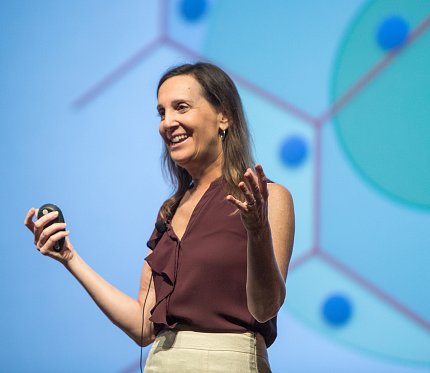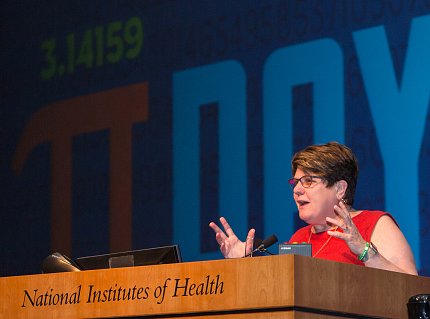PI, PI AGAIN
Rescheduled Pi Day Celebrates Intersection of Math, Science

Photo: Chia-Chi Charlie Chang
NIH held its third annual Pi Day on May 18. Wait. Is that right?
Typically, Pi Day is an annual celebration of the irrational number Pi—3.14...—observed, fittingly, on Mar. 14. This year, inclement weather forced the date change.
Still, on Pi Day and every day, NIH recognizes the importance of building a diverse biomedical workforce with the quantitative skills required to tackle future challenges.
With 10 lightning talks (3 slides, 1 idea, 4 minutes—get it?), a poster session, a data center tour and more, NIH Pi Day was marked by events and activities celebrating the intersection between the quantitative and biomedical sciences.
Dr. Bonnie Berger, Simons professor of mathematics at MIT with a joint appointment in computer science, was the keynote speaker. She spoke on the “Mathematics of Biomedical Data Science.”

Photo: Chia-Chi Charlie Chang
Reminding her audience that she was a mathematician, not a medical person, she discussed the exponential increase in genomic and biomedical data over the past two decades and how it is outstripping advances in computing power.
Extracting new science from these massive datasets will require not only faster computers, she said. It will also require algorithms that scale sublinearly in the size of the datasets. She then discussed the work she and her colleagues are doing to create a new class of algorithms that are able to scale with the entropy and low fractal dimension of the dataset by taking advantage of the unique structure of massive biological data to operate directly on compressed data. These new tools can be used to address large-scale challenges in genomics, metagenomics and chemogenomics.

Photo: Chia-Chi Charlie Chang
NIH Pi Day also offered a behind-the-scenes tour of the NIH Data Center, a secure facility in Bldg. 12. Employees of the Center for Information Technology described how this smallish building houses all core Internet services for NIH, among other essential functions.
Other highlights of the day included a poster session—with presenters at the lightning talks as well as other NIH researchers—where, of course, pizza pie was served. The event ended with a workshop on reproducible science, promoting open and reproducible research using Python and GitHub, in the NIH Library training room.—Melanie Modlin
